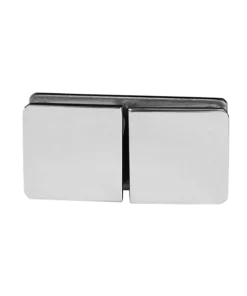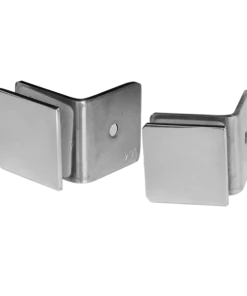Glass Connectors Manufacturer in India
Looking for premium-quality glass connectors? As leading manufacturers, suppliers, and exporters of glass connectors in India, we offer a wide range of durable and aesthetically designed solutions for residential, commercial, and industrial spaces. Our glass connectors ensure precision and strength, making them ideal for frameless glass installations. From T-connectors to L-connectors and more, we provide customizable options to meet your project’s needs. Built from high-grade materials, our glass connectors are engineered for safety and stability while enhancing the visual appeal of your spaces. If you’re in need of reliable and stylish glass connectors, reach out to us today by filling out our enquiry form to discuss your requirements.
AV Industries – Glass Connectors manufacturers, suppliers and exporters in India. Quality approved collection of Glass Connectors.
SPECIFICATION
THICKNESS: 2.5/3/4/5
GRADE: 202/304
FINISH: MAT/CHROME
SHAPES: ROUND/OVAL/SQUARE/RECTANGULAR
Specifications of Glass Connectors
Glass connectors are essential components in various architectural and design applications. Understanding their specifications is fundamental for ensuring that they meet the required functional and aesthetic standards. One of the primary specifications to consider is the thickness of the connectors, which typically ranges from 2.5mm to 5mm. Thicker connectors generally offer enhanced strength and stability, making them suitable for supporting heavier glass panels, while thinner connectors may be advantageous in applications requiring a sleeker, more minimalist appearance.
Another critical aspect is the grade of the materials used in the construction of glass connectors. Common grades include 202 and 304 stainless steel. The choice between these grades significantly impacts durability and corrosion resistance. Grade 304 stainless steel, for instance, is often preferred for outdoor applications or in environments exposed to moisture due to its superior resistance to tarnishing and rust. Therefore, selecting the appropriate grade is vital for ensuring longevity and performance in various conditions.
The finish of glass connectors also plays a crucial role in their practical and aesthetic appeal. Options such as matte and chrome finishes are widely available, each providing distinct qualities. A matte finish tends to conceal fingerprints and smudges, while a chrome finish can offer a highly reflective and polished look, contributing to contemporary design elements. The choice of finish directly influences both visual aesthetics and maintenance needs of the installation.
Furthermore, the shapes of glass connectors—round, oval, square, and rectangular—serve different design purposes. For example, round connectors may be employed in modern architectural settings, while square and rectangular connectors are frequently utilized in traditional designs. Each shape offers unique advantages in terms of load distribution and aesthetic integration into glass structures. Understanding these specifications is crucial for selecting the right glass connectors for specific architectural applications.
Applications and Benefits of Glass Connectors
Glass connectors serve as pivotal components across multiple industries, particularly in construction, interior design, and commercial applications. By providing secure anchoring points, these connectors enable the efficient assembly of glass structures, such as facades, railings, and partitions. The precise choice of specifications for glass connectors greatly influences both functionality and aesthetics, making them essential in modern architectural designs.
In construction, glass connectors are instrumental in creating visually striking yet stable glass facades. Their strength and durability ensure that large glass panels can withstand environmental stressors while maintaining an elegant appearance. Moreover, advancements in connector technology have allowed for the development of sleek solutions that blend seamlessly with architectural designs, enhancing the overall visual appeal of structures.
In the realm of interior design, glass connectors facilitate the creation of innovative spatial divisions while maximizing natural light. They are employed in office spaces and commercial environments to enhance the open feel, allowing for versatile layouts without compromising on privacy. The variety of designs and finishes available allows designers to customize installations to align with branding or thematic elements, thus emphasizing aesthetic flexibility.
Many commercial establishments, such as retail stores and shopping centers, leverage the benefits of glass connectors to construct inviting environments. For example, glass displays and walls not only promote visibility of products but also create a contemporary vibe that attracts customers. These connectors support heavy glass panels while ensuring longevity and safety, reinforcing their importance in high-traffic areas.
Real-world examples illustrate the versatility of glass connectors: from high-rise buildings employing curtain walls to museums utilizing glass exhibits that require secure yet minimalistic joining mechanisms. The application of glass connectors in these contexts establishes a prime balance between safety, functionality, and aesthetic appeal, underscoring their indispensable role in modern architecture.



